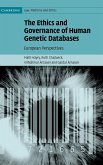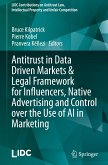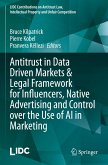A consideration of the legal models designed to protect databases.
Mark Davison examines several legal models designed to protect databases, considering in particular the EU Directive, the history of its adoption and its transposition into national laws. He compares the Directive with a range of American legislative proposals, as well as the principles of misappropriation that underpin them. In addition, the book also contains a commentary on the appropriateness of the various models in the context of moves for an international agreement on the topic. This book will be of interest to academics and practitioners, including those involved with databases and other forms of new media.
Table of content:
1. Introduction: why databases have become an important issue; The structure of the book; 2. Some basic principles; Basic copyright principles concerning databases; Principles of unfair competition; Contract law and databases; Competition law; 3. Protection of databases in the EU; The history of the directive; 4. Transposition of the directive; Belgium; France; Germany; Italy; Ireland; Netherlands; Spain; Sweden; United Kingdom; Transposition of directive 96/9/EC in member states of the EU; 5. Protection of databases in the United States of America; The nature and history of the American tort of misappropriation; The legislative proposals for sui generis protection; The summary of the American position; 6. International aspects of protection of databases; International agreements concerning copyright protection of databases; 7. The appropriate model for the legal protection of databases; The argument in favour of sui generis protection; The non-economic roles of information; Some suggestions for protection of databases.
Hinweis: Dieser Artikel kann nur an eine deutsche Lieferadresse ausgeliefert werden.
Mark Davison examines several legal models designed to protect databases, considering in particular the EU Directive, the history of its adoption and its transposition into national laws. He compares the Directive with a range of American legislative proposals, as well as the principles of misappropriation that underpin them. In addition, the book also contains a commentary on the appropriateness of the various models in the context of moves for an international agreement on the topic. This book will be of interest to academics and practitioners, including those involved with databases and other forms of new media.
Table of content:
1. Introduction: why databases have become an important issue; The structure of the book; 2. Some basic principles; Basic copyright principles concerning databases; Principles of unfair competition; Contract law and databases; Competition law; 3. Protection of databases in the EU; The history of the directive; 4. Transposition of the directive; Belgium; France; Germany; Italy; Ireland; Netherlands; Spain; Sweden; United Kingdom; Transposition of directive 96/9/EC in member states of the EU; 5. Protection of databases in the United States of America; The nature and history of the American tort of misappropriation; The legislative proposals for sui generis protection; The summary of the American position; 6. International aspects of protection of databases; International agreements concerning copyright protection of databases; 7. The appropriate model for the legal protection of databases; The argument in favour of sui generis protection; The non-economic roles of information; Some suggestions for protection of databases.
Hinweis: Dieser Artikel kann nur an eine deutsche Lieferadresse ausgeliefert werden.








